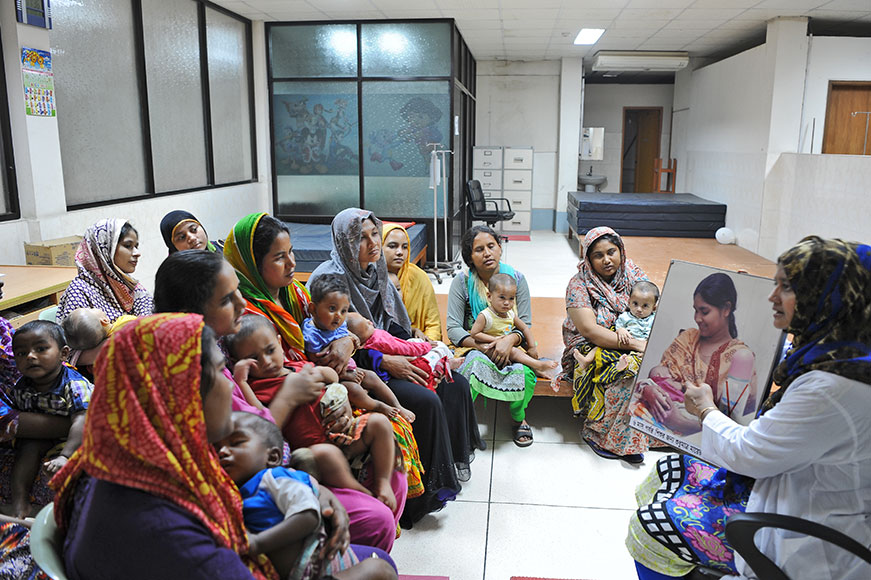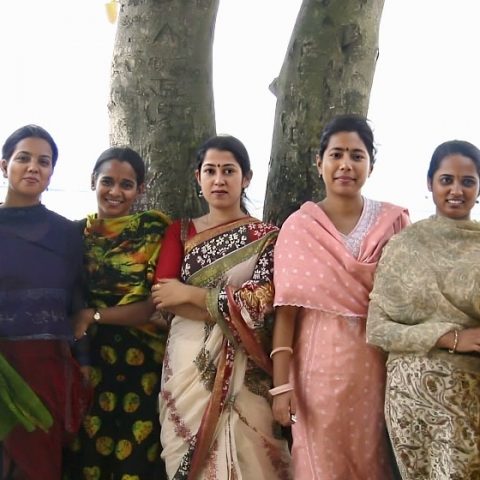Around 29,000 children under the age of five will die every day from preventable causes. More significantly, a death will occur every 21 minutes. While this may seem to be a staggering statistic, the reality is that the current global infant mortality rate is at an all-time low. Between 2000 and 2016, the number of under-five deaths decreased from 9.9 million to 5.6 million at present. However, the proportion of newborn deaths during the same period has increased from 41 per cent to 46 per cent. If the existing trend continues, between 2017 and 2030 more than 60 million children are expected to die before their fifth birthday – half of them newborns.

Peer counselling has shown to motivate almost all mothers to initiate early breastfeeding. Photo: GMB Akash /icddr,b
Malnourished children, especially those with severe acute malnutrition (SAM), have the highest risk of succumbing to a number of illnesses including diarrhoea, pneumonia and malaria. Given that nutrition-related circumstances account for 45 per cent of deaths in children under-five, initiatives to combat malnutrition were introduced in the early years of the 21st century including Community-Based Management of Acute Malnutrition (CMAM). This endeavour allows community volunteers to identify and start treatment for children with SAM before their situation worsens.
Despite the success of CMAM, the approach ‘prevention is better than cure’ will yield optimal results and for newborns, this is early and immediate introduction to breast milk. Breastfeeding offers numerous health benefits for infants that cannot be duplicated with other forms of feeding and the advantages of breastfeeding can begin in the first moments of childbirth and endure for many years after such feeding ends.
Moreover, breastfeeding plays a vital role in the reduction of preventable illnesses pertaining to malnutrition, including wasting, stunting, low-to-underweight, and micronutrient deficiencies, as well as respiratory tract infections, ear infection (otitis media), urinary tract infections. Breastfed children also have a low prevalence for developing Types 1 and 2 diabetes mellitus, asthma, and being overweight or obese.
The World Health Organization and UNICEF recommends early breastfeeding – the initiation of breastfeeding within one hour of birth and exclusive breastfeeding (no other foods or liquids, not even water) for six months. Initiation is encouraged within the first hour of birth with continued feeding for two years, and only introducing nutritionally and age appropriate foods from the sixth month onwards. Statistically, breastfed children have at least six times greater chance of surviving in the early months than non-breastfed babies, and those who are exclusively breastfed are 14 times less likely to succumb to malnutrition or childhood disease
icddr,b has been advocating breastfeeding of newborns, offering counselling services at the breastfeeding clinic in the Dhaka hospital. It is the only facility of this kind in the city, providing re-lactation therapy for mothers through one-on-one sessions as well as group counselling.
This is especially important as many lactating mothers who are admitted to the hospital with diarrhoeal disease will discontinue breastfeeding due to taboo and fear of infecting the child, and the hospital does its utmost to address and reassure their concerns and encourage women to continue feeding.

icddr,b has been advocating breastfeeding of newborns, offering FREE counselling services at the breastfeeding clinic in the Dhaka hospital. Photo: Rabiul Hasan / icddr,b
The institute has also been focusing on supporting women in the ready-made garments sector to optimally breastfeed. A prototype breast milk pasteurisation machine was installed at a garments factory which has allowed the working mothers to pump and store their milk for up to eight hours. When this enterprise is scaled-up, it will allow working women across all sectors the flexibility to safely express and store their milk and reduce the stress of feeding their children.
Research conducted at icddr,b on breastfeeding was the main force for the Bangladesh government’s drive to increase maternity leave from four to six months.
The country is also ahead of other low-and-middle income countries with regards to continued exclusive breastfeeding. In a multi-country cohort study conducted by icddr,b, it showed that 58 per cent of Bangladeshi mothers breastfeed past the age of three months, the highest in a group comprising of Pakistan, India, Nepal, Peru, South Africa, and Tanzania.
Remarkably, the infant mortality rate in Bangladesh is below the global average, where Bangladesh stands at 28.2 deaths per 1,000 live births compared to 30.5 worldwide. To continue this track of reduction, in line with Goal 3.2 of the Sustainable Development Goals, the country needs to establish and encourage communities to support and assist mothers to breastfeed. Often, cultural and social factors will contribute to poor health outcomes, and incorrect information from family members, neighbours and local myths may result in new mothers choosing to adopt practices which are less favourable for their babies.
To counter this practice, peer counselling sessions have demonstrated positive effects on initiation and continuation of breastfeeding practices. Teams at icddr,b organised group meetings constituting pregnant women, lactating mothers and their family members, the latter of whom were encouraged to support the expectant mothers to ensure adequate nutrition, regular check-ups, safe delivery practices, colostrum feeding and continuation of exclusive breastfeeding. The counsellors also conducted home visits, warning mothers of the negative effects of pre-lacteal feeding, breast milk substitutes, and early introduction of complementary feeding.
This (peer counselling) resulted in an overwhelming 89.1 per cent of mothers initiating early breastfeeding, with over 80 per cent citing advice from their peer counsellors as the primary motivator for this practice.
Thus, it is imperative that resources are directed towards early and tailored dietary counselling for both mother and child as maternal diet directly correlates with the nutritional status of breast milk. icddr,b researchers have concluded that mothers whose children suffered from severe acute malnutrition were themselves more likely to be underweight or undernourished, based on their mid-upper arm circumference (MUAC).
It is clear that there needs to be greater emphasis on maternal nutritional status as it can have both short and long-term effects; improved health of the mother will ensure their infants are born healthy. Furthermore, community members need to be made more aware of the importance of breastfeeding to prevent childhood morbidity and mortality, thus giving newborns the best foundation in life.

